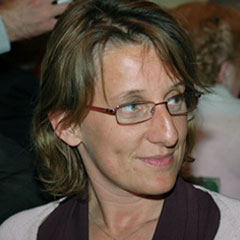Afferenza
Ricevimento e Altre Informazioni
Si ricevono gli studenti da lunedì a venerdì, previo appuntamento concordato via email
Didattica
CV
Pubblicazioni
Ricerca
TEMI CORRENTI DI RICERCA
Studio dei fattori genetici coinvolti nella suscettibilità alla Sclerosi Laterale Amiotrofica (SLA)
La SLA è una patologia neurodegenerativa che porta a morte generalmente entro 2-5 anni dall’esordio. Il 5-10% dei casi ha una storia familiare di malattia (FALS), ma solo nel 60% dei casi FALS è nota la causa genetica. Obiettivi della ricerca sono:
- identificare varianti genetiche causali mediante whole genome sequencing
- Identificare di varianti genetiche di suscettibilità
- Analizzare fattori genetici che permettano un inquadramento diagnostico e/o influenzino il decorso clinico
Dal 2005 co-investigatore di studi nazionali e internazionali, che hanno a) definito lo spettro mutazionale dei pazienti SLA in Italia; b) identificati nuovi geni che causano la SLA, c) definito il ruolo delle varianti comuni nella suscettibilità genetica dei casi sporadici di SLA, d) ha studiato il ruolo del tandem con un approccio di ampio genoma e sequenziamento dell'intero genoma.
2)Atassia spinocerebellare (SCA), sindrome di Parkinson (PS).
Dal 2016 co-investigatore di uno studio nazionale (PRIN 2015), volto a determinare il ruolo delle sequenze ripetute in tandem nella patogenesi di queste due patologie neurodegenerative mediante un approccio di il sequenziamento dell'intero genoma.
Dal 2009 Co-fondatore del Consorzio SLAGEN, un consorzio multicentrico italiano per la genetica della sclerosi laterale amiotrofica (SLA)
Dal 2014 parte del FALS Sequencing Consortium diretto dal Prof. John Landers (University of Massachusetts Medical School) con lo scopo di identificare nuovi fattori genetici causali la sclerosi laterale amiotrofica
Dal 2013 co-fondatore di REPEATALS Consortium (Lab Genetica Università del Piemonte Orientale), Prof. Manzini e Pellegrini (IIT, CNR Pisa) e Dr G De Bellis (ITB-CNR, Milano)
Analysis of genetic factors involved in neurodegeneration
1) AMYOTROPHIC LATERAL SCLEROSIS:
Amyotrophic lateral sclerosis (ALS) is an adult-onset
fatal neurodegenerative disorder affecting mainly the motor system.
Degeneration of upper and/or lower motor neurons in ALS leads to a progressive
and severe muscular weakness with paralysis and death generally occurring
within 2-3 years after disease onset because of respiratory failure. Familial
forms represent 5-10% of cases, and several causative genes have been
identified so far accounting for more than 60% of all inherited forms. Aims of the research
activities are:
- identification of causal genetic variants
by whole genome sequencing
- identification of
susceptibility genetic variants
- identification of
disease- modifier variant
Since 2005 co-investigator of national and international studies, which a)
defined the mutational spectrum of ALS patients in Italy; b) identified new ALS
causing genes, c) defined the role of common variants in the genetic
susceptibility of ALS sporadic cases, d) investigated the role of tandem by a
genome wide approach and whole genome sequencing.
2) SPINOCEREBELLAR ATAXIAS (SCA),
PARKINSON’S SYNDROMES (PS).
Since 2016 co-investigator of national study, which investigated the role
of tandem repeat polymorphisms in the pathogenesis of these two
neurodegenerative disorders by a genome wide approach and whole genome
sequencing.
From 2009 Co‐founder of the
SLAGEN Consortium, an Italian multicentric Consortium for the genetics of
Amythophic Lateral Sclerosis (ALS)
From 2014 coinvestigator of the FALS Sequencing
Consortium directed by Prof. John Landers (University of Massachusetts Medical
School,
From 2013 co-founder of REPEATALS Consortium (Lab
Genetica Università del Piemonte
Orientale), Prof. Manzini e Pellegrini (IIT, CNR Pisa)
e Dr G De Bellis (ITB-CNR, Milano)

